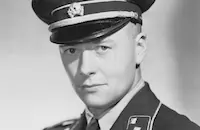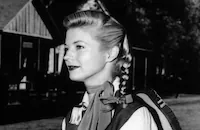Overland Telegraph

Brief Synopsis
Cast & Crew
Lesley Selander
Tim Holt
Gail Davis
Hugh Beaumont
Mari Blanchard
George Nader
Film Details
Technical Specs

Synopsis
After wandering cowboys Tim Holt and Chito Rafferty help Terry Muldoon, who works for her father's Arizona telegraph operation, down from a telegraph pole, she suggests that they seek jobs with Col. Marvin at nearby Fort Craig. Unknown to Terry, Marvin has just been ordered to close down his outpost because the telegraph has rendered the fort obsolete. When Marvin breaks the news to Paul Manning, who has been supplying the fort with equipment and horses, Paul accuses Muldoon of withholding information that would have prevented him from going into heavy debt. Although Marvin tells Paul that Muldoon was not aware of the Army's plans, Paul confers with his best friend, Brad Roberts, a wealthy Mesa City saloon owner, about the situation. Brad assures Paul that the matter will be resolved and that Paul and his sweetheart, singer Stella, should proceed with their wedding plans.
Later, the still unemployed Tim and Chito are heading back to Terry's camp when they hear an explosion. Tim and Chito ride up just as three masked men are destroying the camp and telegraph wires. Tim shoots and wounds one saboteur, Steve, before all three flee on horseback. Assuming that Steve will need a doctor, Tim and Chito ride to nearby Mesa City. There, Steve and his cohort, Bellew, find the doctor absent and go to Brad's saloon office for help. When Tim and Chito walk into the saloon, having seen Steve and Bellew's horses outside the doctor's office, Brad shoots off his gun, then claims that a drunken Steve shot himself. Bellew, meanwhile, sneaks off and hides the horses. Although suspicious of Brad, Tim and Chito have no hard evidence against him and return to Terry's camp. There, Terry accuses Paul of ordering the sabotage, but he maintains his innocence. Terry then hires Tim and Chito as guards and assigns them to meet the next day's stage from Crockerville, on which her father is traveling with a $10,000 payroll. At the same time, Paul pays off Bellew in Brad's office, happy that the sabotage has earned him $50,000 in delays. After Paul leaves, Brad, who was once Stella's beau and is still in love with her, hires Bellew to steal Muldoon's payroll, knowing that Paul will be suspected.
The next day, Bellew and fellow masked henchman Joe hold up the stage and are surprised to find Stella on board. The men grab Muldoon's bag and Stella's purse, then shoot Muldoon. Tim and Chito arrive in time to chase the men off and rush Stella and Muldoon to town. There, Chito escorts Paul to jail to await the sheriff, while Tim and Stella take Muldoon to the doctor. Muldoon soon dies, however, and when Terry learns the news, she storms off to form a lynching party for Paul. To prevent a hanging, Tim and Chito race to the jail, and there Paul admits he was behind the sabotage but refuses to implicate Brad. Tim convinces Paul to ride to Crockerville, where he and Stella are to be married in a few days. Bellew eavesdrops on their plans and reports to Brad, who orders Paul be killed.
Lying in wait on the trail to Crockerville, Bellew and Joe open fire on Paul, wounding him. Bellew escapes but Tim captures Joe. While Chito guards Joe, the unsuspecting Paul guides Tim to Brad's nearby ranch home to recuperate. Bellew, meanwhile, reports to Brad at the saloon, and worried that Joe will talk, Brad orders Bellew to round up some men to find him. At Brad's house, Tim happens to find Stella's stolen purse, and Paul finally reveals Brad's part in the sabotage. Paul also deduces that Brad is trying to frame him because of Stella. Out on the trail, Chito identifies Joe's horse as one he saw outside the doctor's office and, leaving Joe tied up, races to inform Tim. Unguarded, Joe is freed by Brad, Bellew and his men, who then head for Brad's house. Sent back by Tim, Chito spies the men charging off and rushes to Terry's camp for help. At Brad's house, Tim and Paul engage in a shootout with Brad's gang. Brad orders Bellew to set his house on fire, but Tim and Paul put out the flames. Then, just as Chito arrives with Terry, Tim dashes out to shoot and capture Brad. After Bellew and his cohorts are rounded up, Tim exonerates Paul. Later, Tim, Chito and Terry see the newly married Paul and Stella off on their honeymoon.

Director
Lesley Selander
Cast

Tim Holt

Gail Davis
Hugh Beaumont

Mari Blanchard

George Nader

Robert Wilke
Cliff Clark

Russell Hicks
Robert Bray
Fred Graham

Richard Martin
Stanley Blystone
Crew
C. Bakaleinikoff
Samuel E. Beetley
Adele Buffington
Albert S. D'agostino
Stephen Foster
Feild Gray
J. Roy Hunt
Jack Mills
John Pommer
Clem Portman
Frank Sarver
Paul Sawtell
Herman Schlom
Darrell Silvera
Carroll Young

Videos
Movie Clip


Film Details
Technical Specs

Articles
Overland Telegraph - Killer Shark
Davis gets a great entrance: she's hanging from a telegraph post, her leg hooked around the brace, when Tim and Chito hear her cries for help. That was no stunt double, as Davis related to Holt biographer David Rothel. "Tim was a great joker," she recalled. "They got me up to shoot the scene, and he yelled to everybody, 'Lunch!'" Needless to say, they didn't leave her hanging. Her character, Terry, is no mere romantic interest. She runs the work crew and when her father is killed she vows revenge. "It was one of the best scripts for a girl that I'd seen around that particular time," Davis explained. "A lot of times in Westerns they gave the girl the part where she sits at the ranch house waiting for the cowboy to come home, or she waves to the cowboy at the end of the picture as he rides off into the sunset." As Terry, Davis rides, shoots, rounds up a lynch mob, and even charges to the rescue. She went on to a solid career in westerns, regularly appearing in movies and TV shows before taking the lead in Annie Oakley for three seasons.
Hugh Beaumont, famed as the understanding sitcom father on Leave It to Beaver, gets bad guy duty as the owner of the town's saloon and gambling hall, and Robert Wilke, who made a career playing heavies (including one of the gunslingers in High Noon, 1952), is his go-to henchman, an opportunist who has no qualms with murder or extortion.
The character of Chito was created by Martin long before he signed on as Holt's sidekick. He first played Chito in the 1943 war drama Bombardier and reprised the role for a pair Robert Mitchum B-movie oaters, Nevada (1944) and West of the Pecos (1945), before settling in for permanent duty in support of Holt at RKO. Along with comic relief and action support, the charming Chito does all the flirting.
Director Lesley Selander was an old hand of well over 100 westerns (including 20 starring Holt) and almost as many TV episodes. He worked quickly and efficiently on the set while turning out brisk, entertaining films. Even with the decreasing budgets and shorter shooting schedules for Holt's later westerns he provides good production value.
Holt was voted the third most popular western star in the Motion Picture Herald's exhibitors poll for 1951 but the era of the B-movie western was coming to end as the genre moved to TV, along with many of its stars. Holt did not join the migration to the small screen and, apart from a few scattered appearances, retired from acting after making his final RKO western, Desert Passage in 1952.
Sources:
Riders of the Range: The Sagebrush Heroes of the Sound Screen, Kalton C. Lahue. A.S. Barnes and Co., 1973.
Tim Holt, David Rothel. Empire Publishing Company, 1994.
"Tim Holt and the B Western," Tom Stempel. Off Screen Volume 17, issue 11, November 2013.
AFI Catalog of Feature Films
IMDb

Overland Telegraph - Killer Shark
Overland Telegraph
Davis gets a great entrance: she's hanging from a telegraph post, her leg hooked around the brace, when Tim and Chito hear her cries for help. That was no stunt double, as Davis related to Holt biographer David Rothel. "Tim was a great joker," she recalled. "They got me up to shoot the scene, and he yelled to everybody, 'Lunch!'" Needless to say, they didn't leave her hanging. Her character, Terry, is no mere romantic interest. She runs the work crew and when her father is killed she vows revenge. "It was one of the best scripts for a girl that I'd seen around that particular time," Davis explained. "A lot of times in Westerns they gave the girl the part where she sits at the ranch house waiting for the cowboy to come home, or she waves to the cowboy at the end of the picture as he rides off into the sunset." As Terry, Davis rides, shoots, rounds up a lynch mob, and even charges to the rescue. She went on to a solid career in westerns, regularly appearing in movies and TV shows before taking the lead in Annie Oakley for three seasons.
Hugh Beaumont, famed as the understanding sitcom father on Leave It to Beaver, gets bad guy duty as the owner of the town's saloon and gambling hall, and Robert Wilke, who made a career playing heavies (including one of the gunslingers in High Noon, 1952), is his go-to henchman, an opportunist who has no qualms with murder or extortion.
The character of Chito was created by Martin long before he signed on as Holt's sidekick. He first played Chito in the 1943 war drama Bombardier and reprised the role for a pair Robert Mitchum B-movie oaters, Nevada (1944) and West of the Pecos (1945), before settling in for permanent duty in support of Holt at RKO. Along with comic relief and action support, the charming Chito does all the flirting.
Director Lesley Selander was an old hand of well over 100 westerns (including 20 starring Holt) and almost as many TV episodes. He worked quickly and efficiently on the set while turning out brisk, entertaining films. Even with the decreasing budgets and shorter shooting schedules for Holt's later westerns he provides good production value.
Holt was voted the third most popular western star in the Motion Picture Herald's exhibitors poll for 1951 but the era of the B-movie western was coming to end as the genre moved to TV, along with many of its stars. Holt did not join the migration to the small screen and, apart from a few scattered appearances, retired from acting after making his final RKO western, Desert Passage in 1952.
Sources:
Riders of the Range: The Sagebrush Heroes of the Sound Screen, Kalton C. Lahue. A.S. Barnes and Co., 1973.
Tim Holt, David Rothel. Empire Publishing Company, 1994.
"Tim Holt and the B Western," Tom Stempel. Off Screen Volume 17, issue 11, November 2013.
AFI Catalog of Feature Films
IMDb
By Sean Axmaker
Overland Telegraph
Quotes
Trivia
Notes
According to a Hollywood Reporter news item, location shooting for this film took place at Iverson Ranch in Chatsworth, CA.














